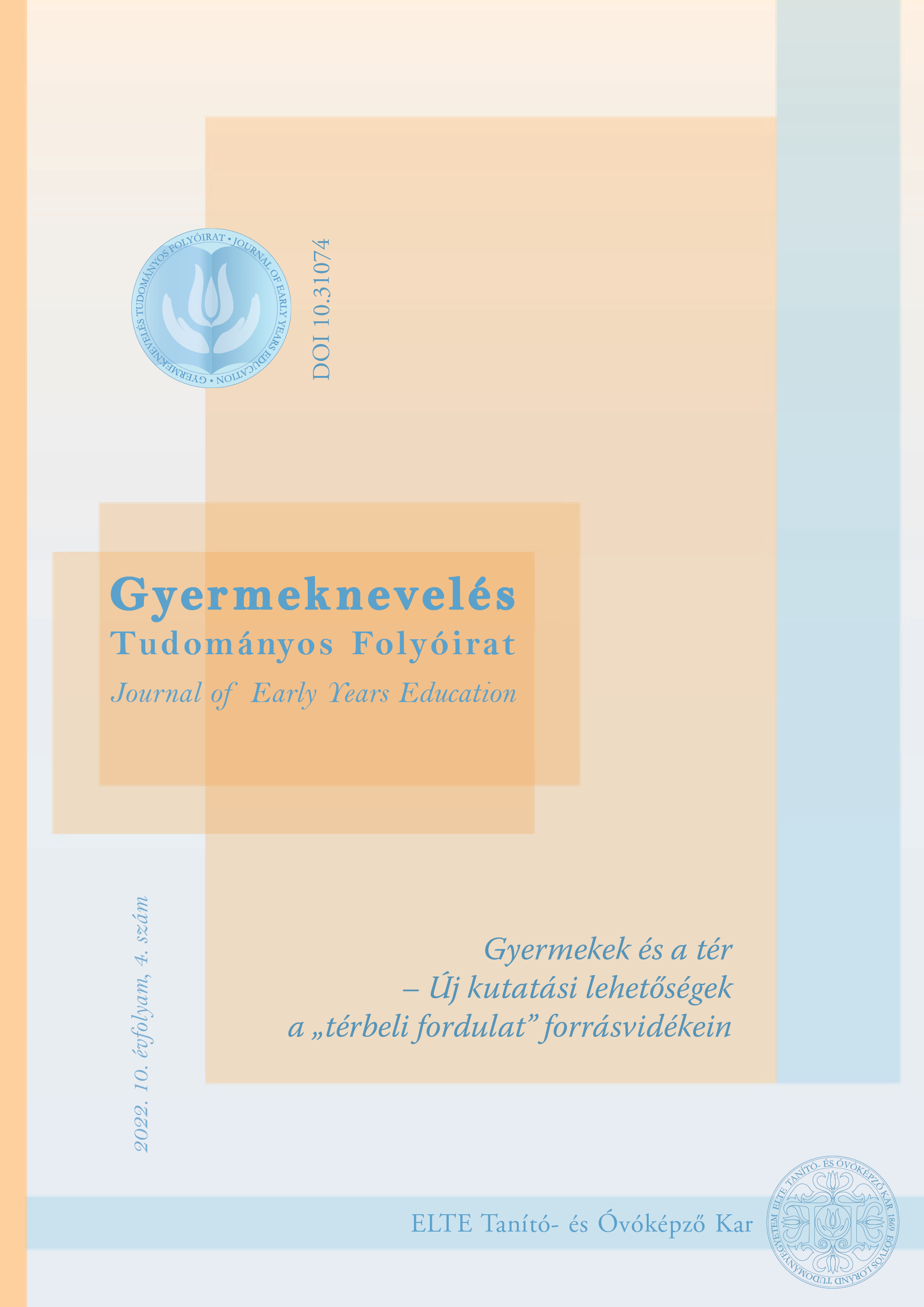What do parents think are the main issues in the transition from kindergarten to primary school?
DOI:
https://doi.org/10.31074/gyntf.2022.4.50.76Keywords:
kindergarten-school transition, starting school, parents’ viewsAbstract
Transition from kindergarten to primary school is widely recognised as the most critical transition in the early childhood phase, as it poses several difficulties for children, families and schools (Britto, 2012). Various researchers (e.g. Pianta & Hamre, 2009) have shed light on the fact that experiences in kindergarten-school transition determine later school success. As a result of this, in recent years increasing attention has focused on the exploration of early childhood development and its long term effects. The importance of discovering parents’ views on transition from early learning to a primary school environment is well known. Lack of parental involvement has a negative impact on the effectiveness of educational institutions (Puccioni, 2018), parents play a crucial role in their children’s readiness for school (Stein et al., 2019), and parents’ convictions have an important role to play in preparing their children for school (Takriti, 2020). Researchers worldwide have therefore aimed to understand g parents’ perceptions of transition from kindergarten to first grade (Fleisz-Gyurcsik, 2021); however, in Hungary, little is known as yet about parents’ views on starting primary school. To collect these, a self-developed online questionnaire was used to collect data from 226 parents of first graders. My results show what parents perceive as factors that make it difficult for children to start school; what roles parents attribute to kindergarten teachers, other teachers, and parents in helping children make the transition; how parents perceive the relationship between the different actors; what kind of institutional programmes to help children make the transition were attended by children before starting school; and the research also aimed to answer the following questions: are there are significant differences between parents regarding whether they seek information about the characteristics of school readiness before the start of school, what sources do they rely on for information, and how satisfied are they with the quality of the information obtained. In-service educators and teachers may use these research findings as a basis, since the results clarify the best way for offering assistance to parents in order to form their views and enhance their knowledge of the characteristics of school readiness.
Downloads
References
évi CXC. törvény a nemzeti köznevelésről. https://net.jogtar.hu/getpdf?docid=a1100190.tv&targetdate=&printTitle=2011.+%C3%A9vi+CXC.+t%C3%B6rv%C3%A9ny
Ahtola, A., Björn, P. M., Turunen, T., Poikonen, P. L., Kontoniemi, M., Lerkkanen, M. K. & Nurmi, J. E. (2016). The concordance between teachers’ and parents’ perceptions of school transition practices: A solid base for the future. Scandinavian Journal of Educational Research, 60(2), 168–181. https://doi.org/10.1080/00313831.2014.996598
Alexander, K. L., Entwisle, D. R., Blyth, D. A. & McAdoo, H. P. (1988). Achievement in the first 2 years of school: Patterns and processes. Monographs of the Society for Research in Child Development, 53, 1–157. 10.2307/1166081
Britto, P. R. (2012). School readiness: A conceptual framework. United Nations
Children’s Fund. https://www.unicef.org/earlychildhood/files/Child2Child_
ConceptualFramework_FINAL(1).pdf
Bronfenbrenner, U. (1979). The ecology of human development: Experiments by design and nature. Harvard University Press.
Commodari, E. (2013). Preschool teacher attachment, school readiness and risk of learning difficulties. Early Childhood Research Quarterly, 28(1), 123–133. https://doi.org/10.1016/j.ecresq.2012.03.004
Correia, K. & Marques-Pinto, A. (2016). Adaptation in the transition to school: perspectives of parents, preschool and primary school teachers. Educational Research, 58(3), 247–264. https://doi.org/10.1080/00131881.2016.1200255
Dockett, S. & Perry, B. (2013). Trends and tensions: Australian and international research about starting school. International Journal of Early Years Education, 21(2–3), 163–177. https://doi.org/10.1080/09669760.2013.832943
Fabian, H. (2007). Informing Transitions. In Dunlop, A. & Fabian, H. (Eds.),
Informing transitions in the early years (pp. 3‒17). Open University Press.
Fleisz-Gyurcsik, A. (2021a). A hazai publikált óvoda–iskola átmenetet segítő gyakorlatok szisztematikus áttekintése. Gyermeknevelés Tudományos Folyóirat, 9(2), 56–90. https://doi.org/10.31074/gyntf.2021.2.56.90
Fleisz-Gyurcsik, A. (2021b). A Systematic Review of Research Exploring Stakeholder Views on the Kindergarten-school Transition. Journal of Studies in Education, 11(3), 147–165. https://doi.org/10.5296/jse.v11i3.18893
Gyurcsik, A. (2020). Az óvoda–iskola átmenet óvodapedagógusok, tanítók és szülők szemén keresztül. Gyermeknevelés Tudományos Folyóirat, 8(3), 189–209. https://doi.org/10.31074/gyntf.2020.3.189.209
Hair, E., Halle, T. & Humen, E. T. (2006). Children’s school readiness in the ECLS- K: Predictions to academic, Health, and social outcomes in the first grade. Early Childhood Research Quarterly, 21(4), 431–454. https://doi.org/10.1016/j.ecresq.2006.09.005
Józsa, K. (2004). Az első osztályos tanulók elemi alapkészségeinek fejlettsége – Egy
longitudinális kutatás első mérési pontja. Iskolakultúra, 14(11), 3–16.
Józsa, K. (2007). Az elemi alapkészségek szerepe az olvasási képesség fejlődésében:
egy longitudinális vizsgálat tapasztalatai. Szimpózium előadás. In Korom, E.
(Ed.), PÉK 2007 – V. Pedagógiai Értékelési Konferencia: Program – Tartalmi
összefoglalók (p. 55). SZTE Neveléstudományi Doktori Iskola.
Kagan, S. L., Moore, E. & Bredekamp, S. (1995). Reconsidering children’s early
learning and development: Toward shared beliefs and vocabulary. Report of the
National Education Goals Panel. Government Printing Office.
Kagan, S. L., Moore, E. & Bredekamp, S. (1995). Reconsidering children’s early learning and development: Toward shared beliefs and vocabulary. Report of the National Education Goals Panel. Government Printing Office.
Kálmán., L. & Tóth, E. (2021). Óvodapedagógusok, tanítók és szülők vélekedései az iskolakészültségről. Iskolakultúra, 31(09), 3–24. https://doi.org/10.14232/ISKKULT.2021.09.3
Margetts, K. (2004). Identifying and supporting behaviours associated with co-operation, assertion and self-control in young children starting school. European Early Childhood Education Research Journal, 12(2), 75–85.
Mérei, F. & V. Binét, Á. (1978). Gyermeklélektan. Gondolat Kiadó.
Nagy, J. (1980). Az 5–6 éves gyermekeink iskolakészültsége. Akadémiai Kiadó.
Nagy, J. (1986). PREFER: Preventív fejlettségvizsgáló rendszer 4–7 éves gyermekek
számára. Akadémiai Kiadó.
Organisation for Economic Co-operation and Development. OECD (2014). Education at a glance 2014: OECD indicators. OECD Publishing. http://dx.doi.org/10.1787/eag-2014-en
Óvodai nevelés országos alapprogramja (2012). 363/2012. (XII. 17.) Korm. rendelet
az Óvodai nevelés országos alapprogramjáról.
Páli, J. (1997). Óvoda-iskola átmenet. In Báthory, Z. & Falus, I. (Eds,), Pedagógiai
lexikon (pp. 93–94). Keraban Kiadó.
Wesley, P. W. & Buysse, V. (2003). Making meaning of school readiness in schools and communities. Early Childhood Research Quarterly, 18(3), 351–375. https://doi.org/10.1016/s0885-2006(03)00044-9
Downloads
Published
How to Cite
Issue
Section
License
Copyright (c) 2022 Author

This work is licensed under a Creative Commons Attribution-NonCommercial-ShareAlike 4.0 International License.

